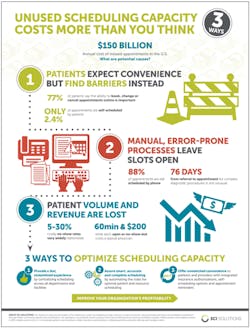Missed appointments cost the U.S. healthcare system $150B each year
Commentary
In our hectic modern-day lives in which we manage personal responsibilities for ourselves and with friends and family, in addition to our professional obligations, it’s no surprise that some appointments, meetings, and reservations just get missed. We understand the impact these missed opportunities have on our personal lives, but in the professional world (especially healthcare), the impact can be costly in both time and money.
The total cost of missed healthcare appointments in the United States every year is an astronomical $150 billion. Each open, unused time slot costs a physician 60 minutes and $200 on average. Now factor in that no-show rates are as high as 30% nationwide, and you can see how that $150 billion figure is reached. With so many high-tech, digital reminders at our disposal, you may wonder how such an expensive and potentially dangerous problem exists. A missed medical appointment could pose serious health risks for patients as it could mean the difference between catching a disease early on or too late. In addition, an inefficient scheduling process can wreak havoc and raise stress levels for both a health systems’ staff and patients.
Below are some tips for health systems to address costly missed appointments:
Provide a fast, streamlined experience for patients to book and keep appointments
Landlines in homes may have become a relic of the past, but it is still the primary method of communication inside the walls of hospitals and physician practices. In fact, an astounding 88% of appointments are still scheduled this way. Today’s consumer expects easy access and engagement in all areas of their lives—we can easily book flights, schedule car repairs, and order a new present within seconds, and consumers increasingly expect this kind of ease when it comes to making doctor appointments.
However, the majority of patients (65%) say they face challenges when trying to engage with their healthcare providers. Even though a recent Accenture report found that 77% of patients think the ability to book, change, or cancel appointments online is important, only 2.4% of appointments today are self-scheduled by the patient. Health systems should provide a fast, streamlined experience by centralizing scheduling, and give patients access to self-scheduling services. Lastly, patient reminders should be automatically sent via voice, text, letter, and/or email, according to their preference.
Assure smart, complete scheduling to maximize capacity and utilization
It is not unusual for complex diagnostic procedures to take, on average, 76 days from referral to appointment—that is almost a full financial quarter of lag time! Much of this is owed to cumbersome manual processes that require too much time from both the patient and scheduling staff even for simple tasks. Health systems can make use of a smart “rules engine” that guides patient access staff through the scheduling of any service, according to the clinical and operational requirements of their providers, departments, and facilities. This can all be done while still making sure medical necessity is met, insurance is verified, and authorizations are obtained prior to the scheduled appointment. For health systems, this will help ensure accurate and efficient completion of the scheduled appointment while optimizing scheduling capacity and protecting revenue.
Offer unmatched convenience
Health systems should minimize the activities that make it difficult for patients and referring providers to do business with them. Eliminate difficulty and delays in care. Convenience comes in the form of patient-friendly experiences throughout the care continuum. Instead of patients having to hand-deliver referrals and orders, make sure referrals and orders are sent electronically. Organizations should handle insurance authorizations promptly as part of the initial scheduling process, and patients should receive friendly appointment reminders to help keep track with their hectic schedules. Health systems that offer this level of convenience will not only save time and money, but also gain a competitive advantage in the market.
We know that the healthcare industry has been slow to adopt the convenient patient access technologies that consumers have come to expect from other industries. However, the good news for health systems is that missed healthcare appointments can be addressed and minimized with these recommendations.




